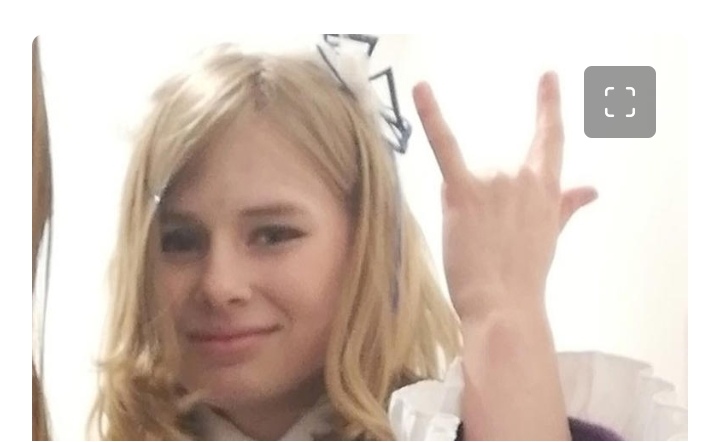The youngest girl who was charged with terrorism offences in the UK was found hanged after being groomed and exploited by American neo-Nazis, a Sunday Telegraph investigation can disclose.
Rhianan Rudd who was described as ‘an absolutely lovely girl’ killed herself while living in a children’s home after being taken into care. She had gouged a swastika onto her forehead at the time of her arrest and had subsequently tried to “scratch it out”, care home staff said.
At the age of just 14, the schoolgirl had been charged with the possession of instructions to make both firearms and explosives. She was accused of having written instructions and a video on how to make a bomb and a guide for the 3-D printing of guns that had so alarmed authorities she was charged with the “commission, preparation of instigation of an act of terrorism”.
It is alleged that a former boyfriend of her mother had been involved in radicalising the child. A US Supreme Court ruling had described Dax Mallaburn as a member of neo-Nazi group the Arizona Aryan Brotherhood.
Rhianan, who had grown up in Essex before moving to Derbyshire, was also groomed and exploited sexually online by a second older American male, sources have told The Sunday Telegraph. Her death raises disturbing questions for British authorities on how to tackle the growing numbers of children being lured into extreme Right-wing terrorism.
The latest official figures show almost one in seven suspects arrested for terrorism offences were aged under 18. Ken McCallum, the director general of MI5, warned last year of “a high prevalence of teenagers, including young teenagers” involved in extreme Right-wing terrorist activity.
.
An inquest into Rhianan’s death, which was opened earlier this month, heard that the 16-year-old was found dead by her carer at Bluebell House in New Ollerton, near Newark, Nottinghamshire, on May 19. Susan Evans, Coroner for Derby and Derbyshire, told the brief hearing that the initial cause of death was “compression to the neck” and set a date for a full inquest next year.
Victim of trafficking
Rhianan, who lived in Bolsover, Derbyshire, was arrested at the age of 14 in October 2020 and had been due to stand trial in August last year at Nottingham Youth Court on six terrorism charges relating to alleged offences.
But the case was delayed and charges subsequently dropped after an intervention by the Home Office, which concluded that the teenager was a victim of trafficking who had been groomed and sexually exploited. Under the modern slavery laws, a child does not have to be subjected to forced movement to be considered a trafficking victim.
Emily Carter, Rhianan’s mother, said: “I feel let down and angry and hurt about what happened to my daughter. It’s been devastating. How everything has gone and the way it was handled – it was wrong in every aspect.”
Ms Carter, 49, said she was considering legal action against the relevant authorities under the Human Rights Act for failing to take steps to protect her daughter. She had visited her daughter on the weekend before she died and had been so concerned that she “rang the care home and I told them something was wrong and please look after her”.
Four days later her daughter was found dead.
Ms Carter, who had moved with her daughter to Derbyshire from Essex, insisted that as far as she knew Mallaburn, with whom she had a three-year relationship, was not involved in her daughter’s radicalisation.
She said: “He [Mallaburn] wasn’t involved to my knowledge. He was involved in that [extremism] in the US, but not while he was with me.”
She said she had since broken all ties with Mallaburn. “I have got nothing to do with him now because anything to do with him brings trouble,” she said.
‘She was making great progress’
Care home staff said they believed Mallaburn had been involved in radicalising Rhianan and that this ideology had left her troubled and “conflicted”.
Rhianan was taken into care at Bluebell House on April 15, 2021, after she had been charged with terror offences. Staff, who were helping her to negotiate the court process, had noticed a swastika carved into her forehead which she had then tried to eradicate.
Pradeep Manaktala, who set up the chain of children’s care homes, said: “Rhianan was a very happy child, but she felt conflicted. She was radicalised by her mother’s American boyfriend, who was a white supremacist and taught her to look at the world that way.
“But at the same time she was being cared for and given unconditional love here by our black and Asian staff. She found it difficult to reconcile this with what she was being told by this white supremacist preacher.
“She had come with a swastika gouged on her forehead but she had attempted to scratch it out.”
His son, Sandeep Manaktala, the director of operations for Blue Mountain Homes, the parent company of Bluebell House, said: “Rhianan came to us from a radicalised background and we took her to the point where she was taking her GCSEs. She was making great progress and what happened was a tragedy.”
Need for Government to beef up Online Safety Bill
Derbyshire County Council, which had taken Rhianan into care, said in a statement: “We were very sad to learn of Rhianan’s death earlier this year and our thoughts remain with her family and friends.
“We have taken part in a review of Rhianan’s case and will ensure that the key points are shared with colleagues across all agencies involved.”
Writing in The Sunday Telegraph below, Jonathan Hall KC, the Independent Reviewer of Terrorism Legislation, said Rhianan’s death and the growing number of teenge terror suspects showed a need for the Government to beef up its Online Safety Bill to protect children from radicalisation.
He said the “tragic case” of Rhianan adds to the evidence “that children are particularly susceptible to being drawn into terrorist offending through encountering terrorism content online”.
Mallaburn an ‘armed career criminal’
Mallaburn has been described by the US authorities as an “armed career criminal”. It is unclear to what extent he was involved in radicalising Rhianan.
In a US Supreme Court ruling in 2019 Mallaburn was described as a member in 2005 of the “Arizona Aryan Brotherhood” who had “circulated a hit list” that had included the name of an undercover federal agent in revenge for infiltrating the Hells Angels.
In 2017, the district court in Arizona refused an appeal by Mallaburn to revoke the terms of his supervised release from prison, on the grounds that he had “failed to establish by clear and convincing evidence that he is not likely to flee or pose a danger to the safety of the community if released”. He had been convicted on firearms charges. He had already served time in a South Carolina prison in 2005.
‘She was an absolutely lovely girl’
Rhianan’s funeral was held at Chesterfield crematorium in July, her body transported by a horse-drawn hearse in memory of a girl who had previously helped out at a local stables.
Janette Hallatt, a dental nurse who met Rhianan through the Church of Jesus Christ of Latter-Day Saints in Chesterfield, said: “It was just so sad. A friend rang me one morning to say Rhianan had hung herself and it was devastating. She was an absolutely lovely girl and I just didn’t expect that of her. I was devastated.”
She added: “I knew Rhianan had been arrested at one point, but nobody really knew the details. Neither Rhianan nor her mother Emily spoke about it at the church. Something terrible must have happened for her to go into care. She should not have hung herself.”
Home Office spokesman said: “This is a tragedy and we wish to express our deepest sympathies.
“Decisions on prosecutions are taken independently by the Crown Prosecution Service (CPS) on a case-by-case basis. The Government is clear in its goal to identify and support victims of modern slavery who may be at risk of exploitation.”
The Online Safety Bill must tackle terrorism content and children head on
by Jonathan Hall KC
As the Online Safety Bill is dusted down and reassembled, Members of Parliament may want to consider the brutal truth that children do not just need protecting from pornography and material promoting self-harm, eating disorders and suicide.
How else to explain the 2021’s haul of counter-terrorism arrests?
A 15-year old from South Derbyshire and a 16-year old from Kent. A 13-year-old boy from Cornwall with personality and developmental issues.
A 15-year-old girl from Derbyshire, charged with downloading a bomb video, later found to have been groomed and sexually exploited online.
A 14-year-old boy from Darlington with complex vulnerabilities.
The list goes on.
There is now a good body of evidence that children are particularly susceptible to being drawn into terrorist offending through encountering terrorism content online.
The tragic case of Rhianan Rudd encapsulates this: arrested at 14, vulnerable, exposed to violent terrorist material, arrested, charged and now dead.
Ofcom said in 2021 that nine per cent of social video platform users had been exposed to radicalisation or terrorism within the last three months. Does anyone know a teenager who does not watch videos on their phone?
Radicalised children can pose a serious terrorist risk to society. And for them, the consequences of being arrested and prosecuted for terrorism offences have a profound impact on life chances, and their families.
The Online Safety Bill misses a trick. For terrorism content, it treats children like adults. Tech companies do not have to assess the specific risk to children from terrorism content, or take special steps to protect children.
We all know that the Online Safety Bill must tread carefully with adult free speech. Children do not have the same ability to profit from this freedom whilst resisting the lure.
Without change, tech companies will point to self-serving community standards as being good enough. They will argue that terrorism content can be educational or artistic, and that it is entirely up to parents to police their children’s internet use.
Far better that the Online Safety Bill tackles terrorism content and children head on.
A better Bill would require user-to-user and search providers to assess the risk that children will encounter terrorism content, and to carry out enhanced steps to minimise the risk of them doing so.
Otherwise, an opportunity will be missed.









Leave a Reply